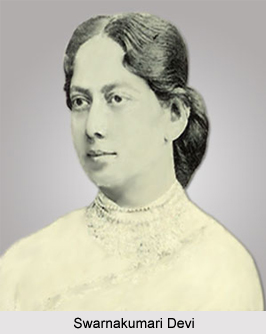 Swarnakumari Devi (28 August 1855 - 3 July 1932) was highly influenced by the male members of the Tagore family who had contributed to the fields of music, theatre and writing. Swarnakumari Devi was the fourth daughter of Debendranath Tagore and granddaughter of Dwarkanath Tagore. She got married to a zamindar family at an early age of thirteen.
Swarnakumari Devi (28 August 1855 - 3 July 1932) was highly influenced by the male members of the Tagore family who had contributed to the fields of music, theatre and writing. Swarnakumari Devi was the fourth daughter of Debendranath Tagore and granddaughter of Dwarkanath Tagore. She got married to a zamindar family at an early age of thirteen.
Literary works of Swarnakumari Devi
Her first novel was Deepnirban(1876). This novel helped in rousing the national spirit. She wrote novels, plays, poems and scientific essays comprehensively. She was eager on developing scientific terminology in Bengali language. She represented a flourishing generation of educated women writers.
In 1879, she composed the first opera in Bengali, Basanta Utsav. She experimented with forms. Later she became the editor of the magazine Bharati. Her novels include: Mibar Raj (1877), Chhinnamukul (1879), Malati (879), Hughlir Imam Badi (1887), Bidroha (1890), Snehalata (1892), Kahake (1898), Bichitra (1920), Swapnabani (1921) and Milanrati (1925). She has written two plays: Rajkanya and Divyakama. She has also written poetry which includes Gatha, Basanta Utsab, Gitiguchha. Prithibi was her only scientific essays.
As her husband was secretary of the Indian National Congress she was also involved in nationalist politics. She also took part in the annual sessions of the Indian National Congress. Sakhi Samiti was started by her in the year 1896 with an aim to assist helpless orphans and widows. She was honoured by University of Calcutta with the Jagattarini gold medal in 1927 and in 1929 she served as the president of the Bangiya Sahitya Sammelan.



















